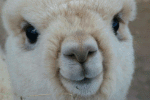Articles by Alpaca World Magazine:
THE EMPTY CHAIR
Mike Safley
A light rain fell as we forded the river on our way to Macusani from Nunoa. It was exactly a year since I last visited Don Julio Barreda at Accoyo on November 17, 2006. The rain turned to hail as we approached the white stucco casa; Elena was there to greet us. On the entry table lay his Gucci sun glasses, alpaca knit cap, and scarf. The table was set for five: bread, cheese, olives, alpaca meat sandwiches, and coca tea. The room was exactly as it was one year ago with pictures of heroes and villains on the wall. And just as I had during fifteen years of visits to Accoyo, I learned.
We began to talk?Elena, Elena?s sister Lupe, and me. With help from Shinny, an East Indian nun who works with Quechua Benefit, we overcame the language barrier and made small talk. I asked about the family. ?They are all well,? Elena said, but the room was full of heavy hearts. We needed to cry and we did at the first mention of Don Julio?s passing. Elena said, ?It was his heart.? But I knew his heart was strong?it created and endured for eighty-seven years. It was just time to go to the other side.
He was gone with almost no warning, and Elena, who had spent her entire life in admiration, love, and service to Don Julio, wanted to die. The funeral, the reception eight days later, along with the delegation from the municipality of Macusani, children from the Mosque Runa Orphanage, Dr. Willy representing Quechua Benefit, alpaca criadores, and countless friends and family left Elena overwhelmed and conflicted. Don Julio made no secret of the fact that he always wanted a son. But not long before he died, he brought his four daughters together to tell them how, later in life, he ?thanked God that he had four daughters instead.? Elena asked herself, ?What would Poppi want?? And in that instant, she knew that he would want her to continue the work of Accoyo. It?s a reason to live, she thought.
Uninvited, lawyers began calling the home in Arequipa, volunteering to help the sisters sell Accoyo and divide the proceeds. Mosies, Acoyo?s lead criador, called from Macusani to say that six men had appeared, with guns raised, to steal fourteen Plantel machos. They chose the best, and Elena was devastated.
Under siege, the family needed to act or Accoyo would slip away. They came together and made a pact. The Barreda sisters would keep the ranch intact until the last one died. Elena, who had spent a lifetime learning Don Julio?s philosophy of alpaca breeding, committed to teach each of the sisters what she had learned. The entire family, including the grandchildren, would begin to operate Accoyo.
With Don Julio?s voice in her ear, Elena left for Macusani to investigate the theft. She soon learned that the police weren?t interested in alpaca rustlers. Elena questioned the witnesses and asked herself what Don Julio would do. A voice told Elena to contact the rondas.
Many years ago, acting as mayor of Macusani during the time of the Shining Path, Julio Barreda realized that the townspeople needed to mount a civil militia; a tactic he knew was effective in other parts of Peru. Each of the larger farms was asked to contribute several men to participate in monthly meetings, communications training, and patrols. Each farm would also supply food and support. They were only lightly armed but observant, keeping a lookout for the thievery that was a bigger problem than terrorists in that remote area of Macusani. The rondas, as the militia was called, remained vigilant and successfully defended the local farms.
Don Julio couldn?t have known that his effort decades earlier would help his family after his death. Elena listened to her father?s advice and turned to the rondas for help. The response was immediate; the men of the local militia tracked the machos to Sicuani, a town not far from Cuzco. A witness identified the thieves, but the local police refused to act. Confronted at gun point by the local men from Macusani, the thieves gave up the Plantel machos, each and every one. This small success restored the family?s optimism.
We finished the last sandwiches, and Elena asked if we would like to visit the paddocks to see the machos. As we made our way up the hill to the alpacas, it seemed as if nothing had changed. The cowboys beamed with pride, and Elena asked them to catch a select group. I asked about the size of the current herd. ?We have 1500?1600 alpacas, 40% suri and 60% huacaya,? said Elena?the same as always.
We reminisced about Don Julio and his vision for alpacas, and I asked about the 20/20 animals that had been Don Julio?s passion.
?We have them,? said Elena.
?May I see??
?Of course,? she said, and asked Moises to catch Baltazhar, an impressive animal who was not too big but had fleece as thick as any I have seen.
?How many pounds did he cut?? I asked.
?Twenty-two pounds!?
?Is he the heaviest cutter you have??
?No, we have Tobayu.?
As Tobayu was caught I asked again, ?How much??
?Twenty-four pounds,? said Elena. She told me that her father had read Charles Massey?s book, Merino, and had seen a ram who sheared fifty-five pounds of wool.
?We can create an alpaca like this,? he said. Who among us can argue with Don Julio?
Elena brought in a group of suris as I chatted with Lupe.
?Did you know that Don Julio had a son?? she asked.
?No!? I said, surprised. In fifteen years of friendship Don Julio had never mentioned a son.
?Do you see the building on the side of the hill, the one with the metal roof and the courtyard fence??
?Yes,? I answered, realizing I had often wondered if a criador?s family lived there but had never asked.
?He is buried there. He died at eleven years of age. His name was Jose Francis,? said Lupe.
The males kept parading into the rock corrals just as they did on every visit, and I asked Elena if Don Julio had any new dreams for the alpacas before he left. Yes, she said, he had a vision for ?white vicuņa? with fleece finer than any of the ?B? line Accoyo. I recalled that Don Julio believed that there could be many breeds of alpaca. He had already developed his ?A? line, or dense breed, and a ?B? line, or fine breed, but I had never heard the term ?white vicuņa.? Today Elena, with ?Poppi? speaking softly in her ear, is hard at work on the dream. She showed me several examples with fleece so fine my ageing eyes could only guess their micron count?well below sixteen, I am sure.
We made our way back to the house, down the hills made platinum by the recent hailstorm. Our breath clouded the path. I couldn?t help but think that Accoyo is alive and well. As we entered the dining room, we saw that the table was again loaded with food?pasta, olives, bread, and lamb piled high. Lupe asked me if I knew who was in the photo above the credenza where Don Julio always sat. No, I said, realizing that I had never noticed the five by seven, black and white photo before. It was a baby picture. ?That was Jose Francis,? said Lupe. ?He died in 1958.?
I glanced at the picture and then at the empty chair where Don Julio always sat. I thought for a moment. Julio is there. As I shared my thoughts with Elena and Lupe, they said, ?No one but Don Julio will ever sit in the chair at the head of the table.? Yes, he is right there, in everyone?s mind and memory?not very far at all.
Today the Barreda family welcomes visitors, and the ranch is thriving. March, April, and May are good months to visit. January and February are about the only months that travel to Accoyo is made impossible by the weather.
As we finished the afternoon meal, I talked to Elena about the time in 1995 when Don Julio asked Mario Pedroza and me if we might find a way to help the children of Macusani. I asked what he thought we could do, and he said, ?They need everything.? Mario asked if we could offer some dental care. ?Bueno!? said Don Julio, and at that moment Quechua Benefit was born. We made our first dental trip to Macusani in 1996. I told Elena that every tooth taken and every blanket given was the result of Don Julio?s desire to help the children of Macusani. His vision will continue long after his passing. Every act of charity will be out of respect for him, and each donation made by an alpaca breeder will be inspired by the path he chose to walk. We hear you Don Julio.
Tweet



